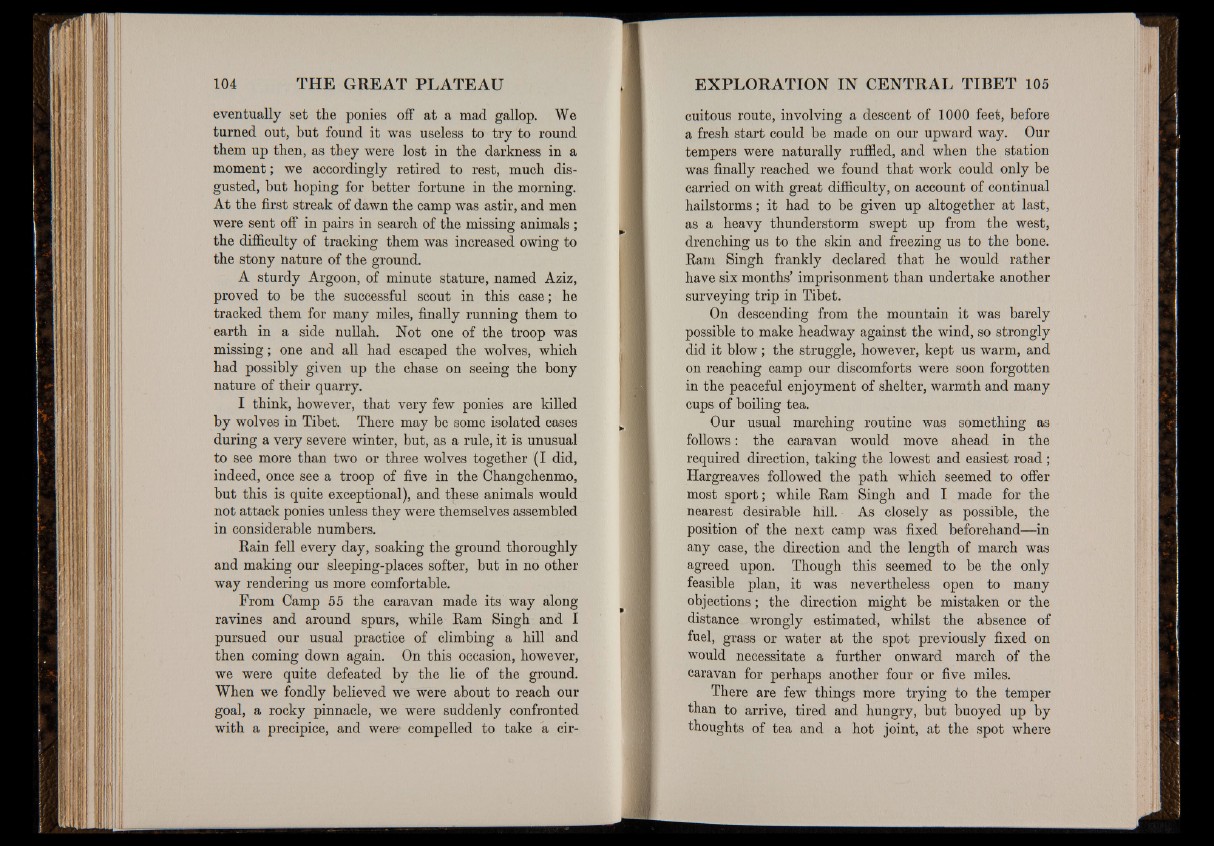
eventually set the ponies off at a mad gallop. We
turned out, but found it was useless to try to round
them up then, as they were lost in the darkness in a
moment; we accordingly retired to rest, much disgusted,
but hoping for better fortune in the morning.
At the first streak of dawn the camp was astir, and men
were sent off in pairs in search of the missing animals ;
the difficulty of tracking them was increased owing to
the stony nature of the ground.
A sturdy Argoon, of minute stature, named Aziz,
proved to be the successful scout in this case; he
tracked them for many miles, finally running them to
earth in a side nullah. Not one of the troop was
missing; one and all had escaped the wolves, which
had possibly given up the chase on seeing the bony
nature of their quarry.
I think, however, that very few ponies are killed
by wolves in Tibet. There may be some isolated cases
during a very severe winter, but, as a rule, it is unusual
to see more than two or three wolves together (I did,
indeed, once see a troop of five in the Changchenmo,
but this is quite exceptional), and these animals would
not attack ponies unless they were themselves assembled
in considerable numbers.
Rain fell every day, soaking the ground thoroughly
and making our sleeping-places softer, but in no other
way rendering us more comfortable.
From Camp 55 the caravan made its way along
ravines and around spurs, while Ram Singh and I
pursued our usual practice of climbing a hill and
then coming down again. On this occasion, however,
we were quite defeated by the lie of the ground.
When we fondly believed we were about to reach our
goal, a rocky pinnacle, we were suddenly confronted
with a precipice, and were* compelled to take a circuitous
route, involving a descent of 1000 feet, before
a fresh start could be made on our upward way. Our
tempers were naturally ruffled, and when the station
was finally reached we found that work could only be
carried on with great difficulty, on account of continual
hailstorms; it had to be given up altogether at last,
as a heavy thunderstorm swept up from the west,
drenching us to the skin and freezing us to the bone.
Ram Singh frankly declared that he would rather
have six months’ imprisonment than undertake another
surveying trip in Tibet.
On descending from the mountain it was barely
possible to make headway against the wind, so strongly
did it blow; the struggle, however, kept us warm, and
on reaching camp our discomforts were soon forgotten
in the peaceful enjoyment of shelter, warmth and many
cups of boiling tea.
Our usual marching routine was something as
follows: the caravan would move ahead in the
required direction, taking the lowest and easiest road ;
Hargreaves followed the path which seemed to offer
most sport; while Ram Singh and I made for the
nearest desirable hill. As closely as possible, the
position of the next camp was fixed beforehand—in
any case, the direction and the length of march was
agreed upon. Though this seemed to be the only
feasible plan, it was nevertheless open to many
objections; the direction might be mistaken or the
distance wrongly estimated, whilst the absence of
fuel, grass or water at the spot previously fixed on
would necessitate a further onward march of the
caravan for perhaps another four or five miles.
There are few things more trying to the temper
than to arrive, tired and hungry, but buoyed up by
thoughts of tea and a hot joint, at the spot where